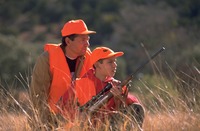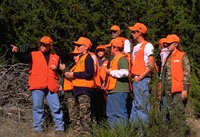1 - Introduction
 The primary objective of hunter education is to produce safe, responsible, knowledgeable and involved hunters. As the years pass, you will increase your knowledge and improve your skills but the most critical component to becoming a safe and ethical hunter is your attitude.
The primary objective of hunter education is to produce safe, responsible, knowledgeable and involved hunters. As the years pass, you will increase your knowledge and improve your skills but the most critical component to becoming a safe and ethical hunter is your attitude.
Why take Hunter Education?
- Reduce hunting-related injuries and fatalities.
- Develop safe and ethical behavior.
- Comply with Texas law.
Hunting - Safe and Getting Safer!
Over the last 30 years hunting accidents have drastically decreased, while the number of hunters has increased. Today, hunting is one of the safest outdoor activities you can enjoy.
| Outdoor Activity | Number of Participants | Annual Injuries | Injuries per 100,000 Participants |
|---|---|---|---|
| Football | 9,300,000 | 489,676 | 5,265 |
| Basketball | 26,900,000 | 528,524 | 1,965 |
| Bicycling | 39,800,000 | 530,551 | 1,333 |
| Baseball | 12,500,000 | 162,925 | 1,303 |
| Softball | 10,800,000 | 119,389 | 1,105 |
| Fishing | 33,800,000 | 69,963 | 207 |
| Swimming | 51,900,000 | 101,660 | 196 |
| Hunting | 16,300,000 | 8122 | 50 |
| 2010 Participation & Injury national data released by the National Shooting Sports Foundation. | |||
In Texas there were 25 hunting accidents in 2012. With 1,155,542 hunting licenses sold, there were 2.2 injuries per 100,000 participants.
Why is hunting so safe?
 Regulations: Hunter orange laws or laws restricting loaded firearms in vehicles.
Regulations: Hunter orange laws or laws restricting loaded firearms in vehicles.
Education: Now required in all states and most Canadian provinces and territories.
The number of Texas hunting accidents in 2011 declined to the lowest since statistical records began in 1966. The number of people injured in hunting accidents in Texas fell from 25 in 2010 to 23 in 2011, and fatalities also declined from four to two in the same period.
Check Hunter Education requirements in the state or Canadian province you're hunting. Before hunting, be sure to read the most current hunting regulations of that particular state or province.
Generally Speaking:
- All states in the U.S. and 10 of 13 Canadian provinces require the completion of a Hunter Education course.
- States and provinces have records of Hunter Education graduates.
- All Hunter Education certifications are accepted in all other states and provinces.
Contact your local wildlife office for more details.